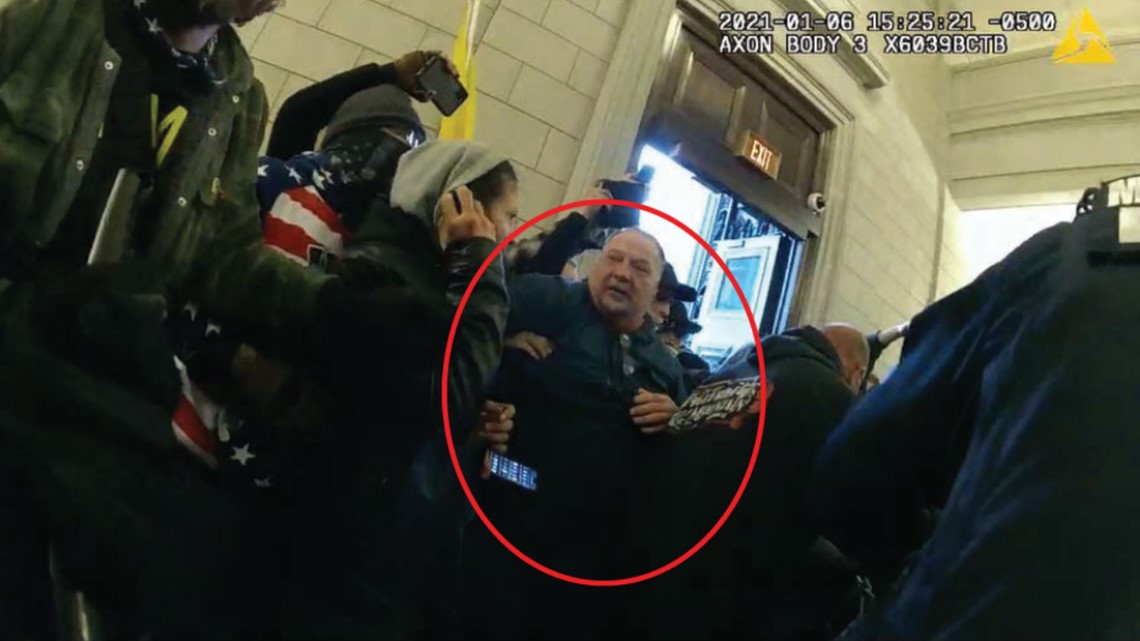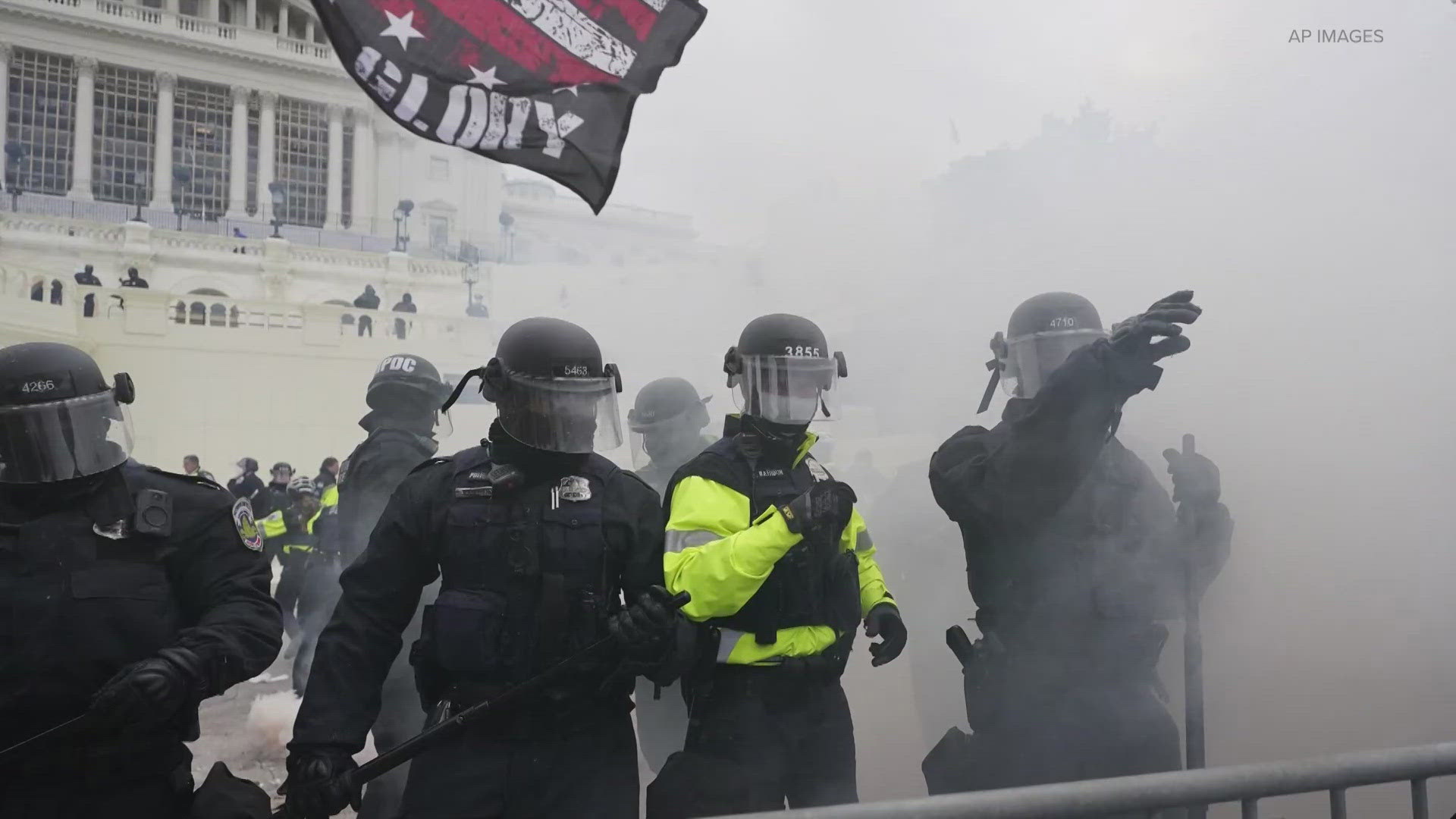WASHINGTON — The U.S. Supreme Court pressed the Justice Department Tuesday on the breadth of a post-Enron obstruction statute used in hundreds of Jan. 6 cases, with justices repeatedly posing questions about whether, and how, it could be used against future protestors.
The justices’ decision, which is expected in June, could have major ramifications for more than 300 defendants charged with obstructing the certification of the 2020 election. Former President Donald Trump, who was indicted last year on four felony counts related to his own efforts to overturn the results of the election, faces the same charge.
The challenge was brought by Joseph W. Fischer, a former Pennsylvania police officer facing multiple felony counts for allegedly charging a line of police inside the U.S. Capitol on Jan. 6. One of those counts, 18 U.S.C. § 1512(c)(2) — obstruction of an official proceeding – was dismissed in 2022 by U.S. District Judge Carl Nichols. Judge Nichols, a former deputy assistant attorney general who was nominated to the federal bench by Trump in 2019, found that the law required Fischer and other defendants to “have taken some action with respect to a document, record, or other object in order to corruptly obstruct, impede or influence an official proceeding.”
The DOJ appealed Nichols’ decision, and last April, a three-judge panel of the D.C. Circuit agreed and reversed Nichols, setting up Fischer’s appeal to the Supreme Court.
At issue is the meaning of the word “otherwise” in the 18 U.S.C. § 1512(c)(2) statute:
(c)Whoever corruptly—
(1) alters, destroys, mutilates, or conceals a record, document, or other object, or attempts to do so, with the intent to impair the object’s integrity or availability for use in an official proceeding; or
(2) otherwise obstructs, influences, or impedes any official proceeding, or attempts to do so,
shall be fined under this title or imprisoned not more than 20 years, or both.
Congress created the law in 2002 to close a loophole that helped Enron’s auditing firm, Arthur Andersen, evade charges for destroying potentially incriminating documents. Arguing for Fischer, attorney Jeffrey T. Green said Congress meant the law to be limited to punishing those who tried to prevent evidence from being available or to falsify evidence in an official proceeding.
Multiple justices took issue with that reading, however, and suggested it was against the plain text of the statute. Justice Sonia Sotomayor offered the analogy of a theater with a sign prohibiting pictures, recordings or otherwise disturbing the performance.
“If you start yelling, I think no one would question you could be kicked out under this policy even though yelling has nothing to do with photography or recording,” Sotomayor said.
Several justices also echoed a point made by Justice Elena Kagan that Congress could have written the law specifically to be about evidence impairment if it had wanted to.
“But they didn’t do that,” Kagan said. “They just said ‘obstruct an official proceeding.’”


The court did not, however, appear willing to easily accept the government’s preferred reading of the statute as a catch-all clause that would cover a wide range of obstructive actions. The court’s conservative wing repeatedly questioned Solicitor General Elizabeth B. Prelogar about how the DOJ had used the charge in the past and how it might use it in the future, given the court’s assent, to prosecute non-violent protests around the country.
“Would a sit-in that disrupts a trial, or access to a federal courthouse, qualify?” Justice Neil Gorsuch asked. “Would a heckler in today’s audience qualify, or at the State of the Union address? Would pulling a fire alarm before a vote qualify?”
Justice Samuel Alito echoed the same concerns.
“What happened on Jan. 6 was very, very serious and I’m not equating [courtroom hecklers] with that,” he said. “But we need to find out the outer reaches of this.”
Prelogar, who previously clerked for Justices Kagan and Ruth Bader Ginsburg, said the statute itself provided guardrails, including a requirement that defendants obstruct a proceeding for a “corrupt” purpose. She also said the word “obstruct” contains an inherent limit on charging actions that have a minor effect on a proceeding – although the court seemed disinclined to accept that as a substantial safeguard.
Two members of the court, Justices Amy Coney Barrett and Ketanji Brown Jackson probed whether the DOJ believed its charges could hold up even with an evidence record requirement because of the physical ballots that are submitted by the states to Congress – seemingly exploring a third option that would narrow the statute from the DOJ’s view, but leave most Jan. 6 prosecutions unaffected.
“We can satisfy even an evidence-related reading of (c)(2),” Prelogar said, adding, however, that other federal appeals courts have previously looked at the matter and the “uniform consensus” has been that the statute has no evidence-impairment requirement.
Green, on rebuttal, argued siding with the DOJ would set a dangerous precedent that would allow federal prosecutors to charge protected speech activities as criminal conduct and urged the justices to reverse the D.C. Circuit.
Of the more than 1,300 people now charged in connection with the Capitol riot, more than 330 have been charged with 18 U.S.C. § 1512(c)(2). Of those, more than 150 have already been sentenced – including former Proud Boys national chairman Enrique Tarrio, who received 22 years in prison, and Oath Keepers founder Stewart Rhodes, who received 18 years. Approximately 50 defendants have been sentenced with 18 U.S.C. § 1512(c)(2) as their only charge as part of a plea deal.
Last month, the D.C. Circuit ruled that two sentencing enhancements were improperly used in cases involving the obstruction charge. Dozens of defendants have since sought resentencing or release from prison while they appeal, although those requests have infrequently met with success.

